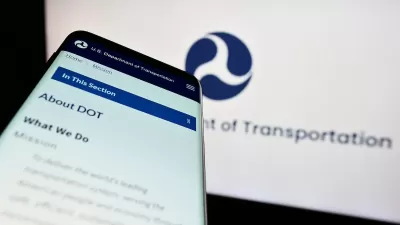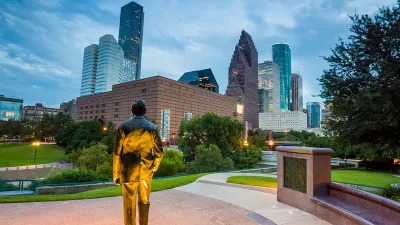Politico explores some of the projects that could be scrapped as a result of being located in sanctuary cities.

Infrastructure projects throughout the country are in limbo due to Trump's executive order barring jurisdictions that refuse to cooperate with federal immigration officials from receiving federal funds. In Politico, Tanya Snyder profiles a series of the projects that could be affected, and explores how cities are responding to the threat.
"Virtually all of the heavily Democratic urban areas declaring themselves ‘sanctuaries’ have accepted or are seeking hundreds of millions of federal dollars to advance major transportation projects," she notes.
Though billions of dollars' worth of infrastructure could be at stake, it's unclear what is going to happen next. There is not yet a list of specific cities or projects whose funding will be cut off. Nor does there appear to be a plan for distributing funds to regional bodies that might include sanctuary cities—like metropolitan planning organizations (MPOs), transit agencies, and airport or port authorities.
Withholding funds from major cities could also have serious regional impacts.
Considering that Boston, New York, Chicago, San Francisco, Los Angeles and Washington, D.C., have all declared themselves sanctuaries for undocumented immigrants, Trump’s reprisals could end up canceling or delaying major infrastructure projects in some of the nation’s most congested areas — even as the administration touts a $1 trillion proposal to rebuild the United States’ roads, railroads, bridges and airports.
FULL STORY: Trump’s ‘sanctuaries’ crackdown imperils transportation projects

Planetizen Federal Action Tracker
A weekly monitor of how Trump’s orders and actions are impacting planners and planning in America.

Maui's Vacation Rental Debate Turns Ugly
Verbal attacks, misinformation campaigns and fistfights plague a high-stakes debate to convert thousands of vacation rentals into long-term housing.

San Francisco Suspends Traffic Calming Amidst Record Deaths
Citing “a challenging fiscal landscape,” the city will cease the program on the heels of 42 traffic deaths, including 24 pedestrians.

Amtrak Rolls Out New Orleans to Alabama “Mardi Gras” Train
The new service will operate morning and evening departures between Mobile and New Orleans.

The Subversive Car-Free Guide to Trump's Great American Road Trip
Car-free ways to access Chicagoland’s best tourist attractions.

San Antonio and Austin are Fusing Into one Massive Megaregion
The region spanning the two central Texas cities is growing fast, posing challenges for local infrastructure and water supplies.
Urban Design for Planners 1: Software Tools
This six-course series explores essential urban design concepts using open source software and equips planners with the tools they need to participate fully in the urban design process.
Planning for Universal Design
Learn the tools for implementing Universal Design in planning regulations.
Heyer Gruel & Associates PA
JM Goldson LLC
Custer County Colorado
City of Camden Redevelopment Agency
City of Astoria
Transportation Research & Education Center (TREC) at Portland State University
Jefferson Parish Government
Camden Redevelopment Agency
City of Claremont





























